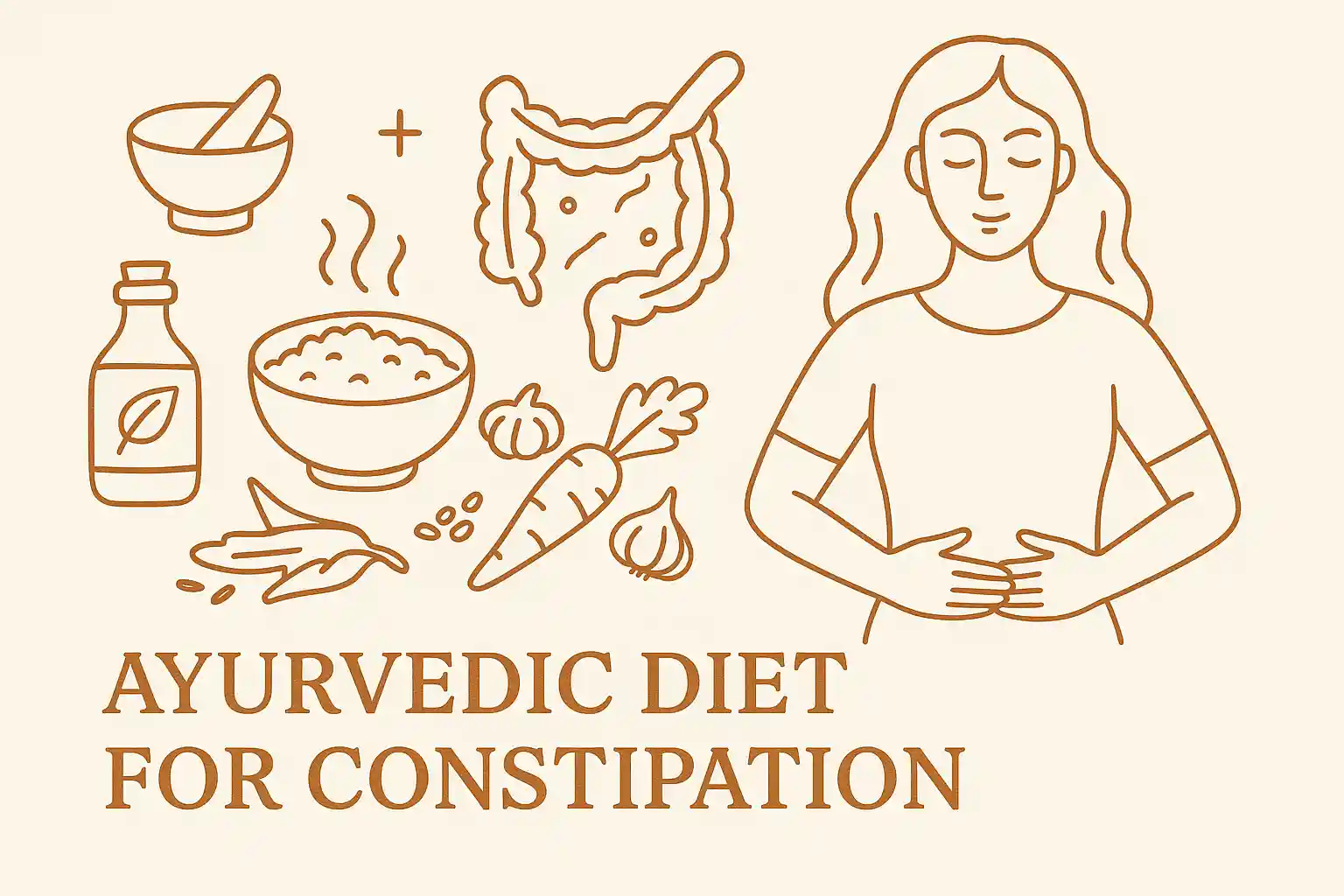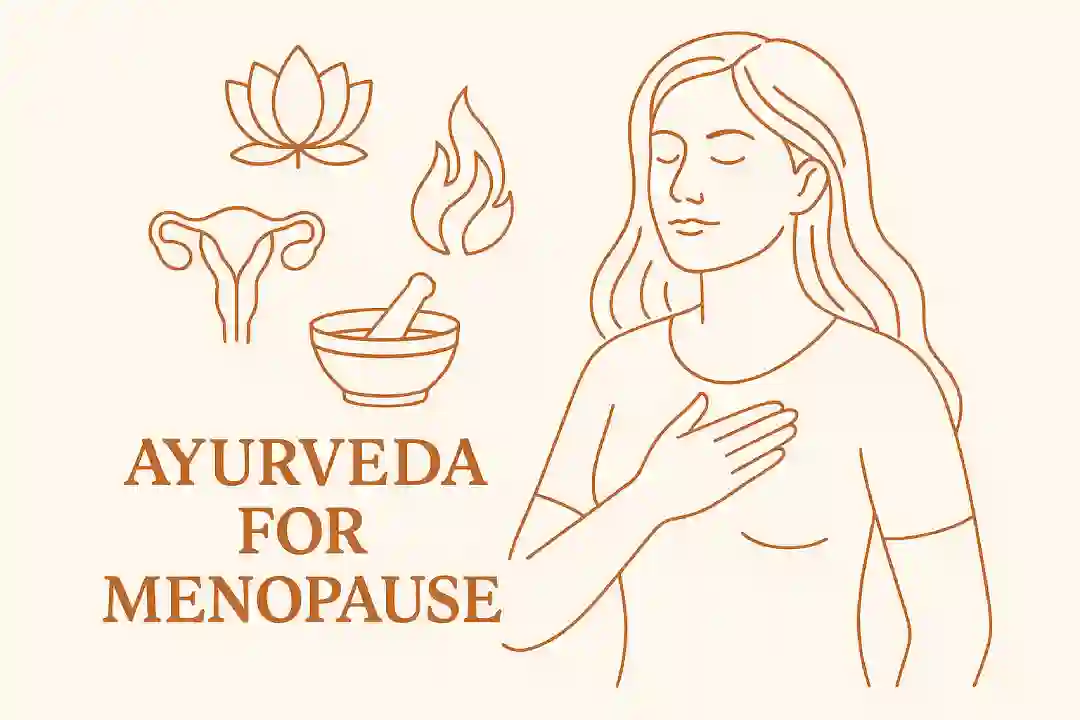Menopause marks a significant and natural transition in a woman's life—an end to menstruation and the beginning of a new phase. From an Ayurvedic perspective, this stage is not an illness to be treated, but a transformation to be supported gently through nourishing food, steady routines, and lifestyle practices that honor the body's changing needs.
Ayurveda views menopause primarily through the lens of Vata dosha, which tends to increase during this time, often bringing dryness, sleep disturbances, anxiety, and irregular digestion. The key is to balance Vata, while gently supporting Pitta and Kapha as needed. Diet plays a central role in this process.
Ayurvedic Approach to Menopausal Nutrition
In Ayurveda, food is medicine. At menopause, the right foods can support:
Vata Balance
Countering dryness, irregularity, and anxiety through grounding, warming foods.
Agni Support
Maintaining digestive fire, metabolism, and mental clarity.
Ojas Building
Building long-term immunity, vitality, and emotional stability.
Hormonal Harmony
Supporting balance through naturally rejuvenating (Rasayana) foods and herbs.
The focus is on warm, moist, nourishing meals with calming spices and healthy fats.
Best Ayurvedic Foods for Menopause
1. Warm, Moist, Grounding Meals
| Food Category | Best Choices | Ayurvedic Benefits |
|---|---|---|
| Cooked Whole Grains | Rice, oats, quinoa, barley cooked into soft porridge or khichari | Support digestion and soothe the nervous system |
| Soups & Stews | Made with root vegetables, mung dal, or lentils | Gently spiced with cumin, coriander, and ginger for digestive support |
| Root Vegetables | Sweet potatoes, carrots, beets—baked or stewed | Help ground Vata and provide natural sweetness |
2. Healthy Fats to Moisturize the Tissues
- Ghee: Lubricates the tissues, aids digestion, and enhances Ojas. Use daily in cooking.
- Sesame oil: Both internally and externally (via abhyanga self-massage), sesame oil is Vata-pacifying and warming.
- Avocados and soaked nuts: Almonds, walnuts, and seeds like flax and chia provide moistening and hormone-supportive fats.
3. Ojas-Building and Rejuvenative Foods
- Warm milk with spices: Organic cow's milk (if tolerated) with turmeric, cinnamon, or saffron supports sleep and calm.
- Soaked almonds and dates: Nourishing snacks that support energy and vitality.
- Stewed fruits: Apples or pears simmered with cinnamon and cardamom for sweetness and ease on digestion.
4. Supportive Spices and Herbs
Ashwagandha
A grounding adaptogen that supports sleep, stress response, and energy.
Shatavari
Traditionally used for female hormonal balance and reproductive tissue support.
Warming Spices
Cinnamon, cardamom, ginger support digestion without overheating.
Sample Day of Menopause-Supportive Eating
| Time | Meal or Practice |
|---|---|
| Morning | Warm water + golden milk (with ashwagandha or ghee) |
| Mid-Morning | Soaked almonds + 1–2 dates |
| Lunch | Khichari with steamed vegetables and ghee |
| Afternoon | Herbal tea (fennel, chamomile) + stewed apple |
| Dinner | Vegetable soup + small portion of cooked grain |
| Before Bed | Warm milk with nutmeg or shatavari (if appropriate) |
This daily rhythm supports digestion, steadiness, and sleep.
Lifestyle Tips to Complement Your Diet
Self-Care Practices
- Abhyanga (oil massage): Use warm sesame oil on the body before bathing to calm Vata and nourish the skin.
- Consistent meal timing: Helps regulate digestion and mood.
Daily Wellness
- Gentle movement: Daily walks or restorative yoga balance Vata and support lymphatic flow.
- Sleep hygiene: Light dinners, warm evening drinks, and regular bedtime support restful sleep.
FAQ: Ayurvedic Food for Menopause
- Ashwagandha: Strengthens resilience and reduces anxiety
- Shatavari: Supports hormonal and reproductive health
- Licorice: Nourishes adrenals and moistens tissues (use with guidance)
- Avoid spicy, fried, and overly sour foods
- Include cooling herbs like fennel or coriander if Pitta is high
- Use coconut oil or aloe vera juice (if tolerated) for internal cooling
Final Thoughts
Ayurveda honors menopause as a sacred transition. With warm, grounding foods, supportive herbs, and nurturing daily habits, this life stage can become a time of deep inner wisdom, clarity, and vitality. Nourish yourself from the inside out—with food that calms, strengthens, and sustains.
Related Articles

Ayurveda Foods for Sleep Issues: A Practical, People-First Guide (US & India)
Discover Ayurvedic foods and bedtime recipes to improve sleep naturally. Learn practical nutrition tips, dosha-based approaches, and gentle remedies for insomnia relief.
12 min read min read
Ayurvedic Diet for Constipation: Foods, Herbs, and Practices to Restore Regularity
Ease constipation naturally with Ayurvedic foods, herbs, and Vata-balancing practices. Support digestion and restore regularity gently and holistically.
min read
